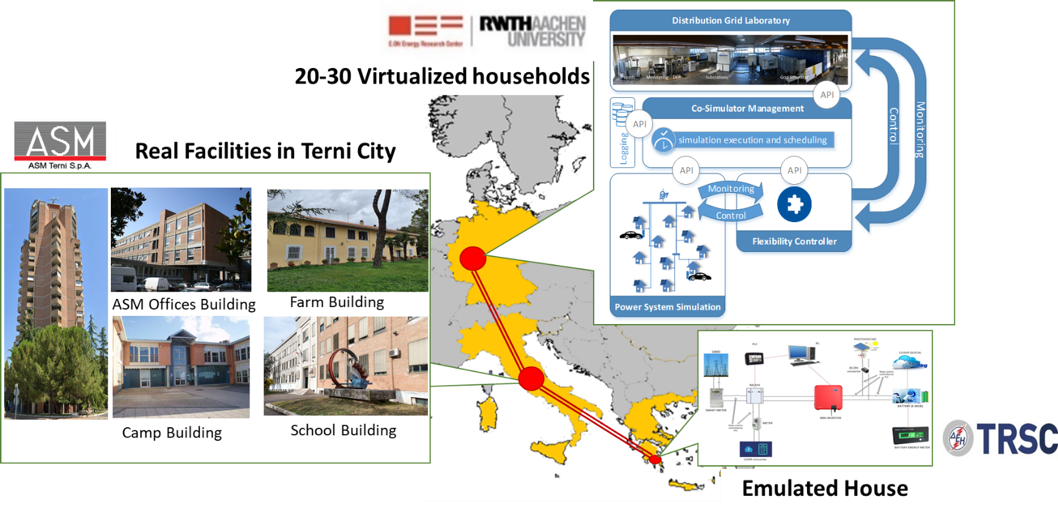LSP 4: Collaborative /DSO flexibility vs cybersecurity and privacy
The LSP4 will be a collaborative/DSO flexibility vs cybersecurity and privacy pilot mainly based in Terni city, interconnected with a simulation facility in Aachen (Germany) and an emulated facility in Lavrio (Greece). In Terni, the LSP4 will leverage the ASM flexibility management system (FMS), which can manage a number of block-of-energy units (production and consumption at ASM headquarters) and multiple Smart Meters in the Terni city reaching, for the LSP4 purpose, 600 kW as consumption peak power and 500 kW as production peak power. In detail, the LSP4 will include 3 prosumers, 3 producers, 1 building of apartments, 4 Industrial sites, 1 Farm, 1 School/University facility and ASM office building (with controllable load, 2 PV, a battery energy storage and 3 Electrical Vehicles chargers).
In Aachen, RWTH (E.ON. Energy Research Centre) will offer a state of the art laboratory which will be fully operational in Q3 2021. It will offer 5 emulated household consumers using controllable assets (load-banks, PV-inverters, storage systems), 20-30 virtualized household consumers (identical to real household consumers, with synthetic load and generation profiles), a large load-bank (up to 1.2MW) and large inverters (~ 200 kVA). Finally, in Lavrio, PPC will offer a real emulated house, with a PV and connection to the smart grid.
Looking at the PHOENIX project, it is intended to detect security attacks to this IT system. Therefore, on the one hand process data of all the above-mentioned real assets from Terni and on the other hand access logfiles from the Terni Demand Site Response (DSR) platform and the Smart meter platform will be collected and provided periodically for investigation to PHOENIX and as input to the RWTH Lab platform. These data are transmitted to a central PHOENIX platform where the intrusion detection and further analysis is performed. The DSR implementation combines several Software as a Service solutions. Consequently, it comes with accordingly quite a lot of external cloud systems necessary to be connected to the DSR. It is the prototype of a compound software system which results in a spread responsibility. PHOENIX project will benefit from this scenario. The Lavrio site will be used mainly for demonstration of countermeasure automatic switching between produced PV electricity and Smart Grid connection.
PHOENIX LSP4 will take advantage of the DSR deployment to validate flexibility versus cybersecurity and privacy attacks. PHOENIX will analyse the Terni building assets and DSR logs and events, along with aggregated energy prosumption at neighbourhood and city sections to validate several cybersecurity scenarios:
- Cybersecurity attacks on home assets and DSR platform platform: Analysis of system-level cybersecurity threats at building and at DRS platform level plus communication and exposed interfaces. Validation of resilience against attacks and vulnerabilities. In homes and on DRS-system level IT-security devices will be employed to identify attacks and communicate to the PHOENIX incidents platform.
- Sensitive data privacy attacks: Analysis of anonymized power profile records from domestic energy assets and from the DSR- aggregation to mitigate abnormal, significantly increased energy demand as well as to make sure, the power profiles protect the customer privacy by hiding high-resolution details.
- Survivability and Self-healing capabilities: Validation of survivability and recovery of the DRS-System from cybersecurity attacks.

Latest PHOENIX Tweets
![]() This project has received funding from the European Union’s Horizon 2020 research and Innovation programme under grant agreement N°832989. All information on this website reflects only the authors' view. The Agency and the Commission are not responsible for any use that may be made of the information this website contains.
This project has received funding from the European Union’s Horizon 2020 research and Innovation programme under grant agreement N°832989. All information on this website reflects only the authors' view. The Agency and the Commission are not responsible for any use that may be made of the information this website contains.
Related projects
Privacy Overview
Necessary cookies are absolutely essential for the website to function properly. This category only includes cookies that ensures basic functionalities and security features of the website. These cookies do not store any personal information.
| Cookie | Type | Duration | Description |
|---|---|---|---|
| __cfduid | 1 | 1 month | The cookie is set by CloudFare. It is used to identify individual clients behind a shared IP address and apply security settings on a per-client basis. It does not correspond to any user ID in the web application and does not store any personally identifiable information. |
| _wpfuuid | 0 | 10 years | Contact form UUID (Universally Unique Identifier) cookie. It allows the plugin to connect entries by the same user and does not contain or represent any personal information or entry details. |
| cookielawinfo-checkbox-necessary | 0 | 11 months | This cookie is set by GDPR Cookie Consent plugin. The cookies is used to store the user consent for the cookies in the category "Necessary". |
| cookielawinfo-checkbox-non-necessary | 0 | 11 months | This cookie is set by GDPR Cookie Consent plugin. The cookies is used to store the user consent for the cookies in the category "Non Necessary". |
| test_cookie | 0 | 11 months | |
| viewed_cookie_policy | 0 | 11 months | The cookie is set by the GDPR Cookie Consent plugin and is used to store whether or not user has consented to the use of cookies. It does not store any personal data. |
These cookies are used to calculate visitor, session, campaign data and keep track of site usage for the site’s analytics report. The cookies store information anonymously and assigns a randomly generated number to identify unique visitors.
| Cookie | Type | Duration | Description |
|---|---|---|---|
| _ga | 0 | 2 years | This cookie is installed by Google Analytics. It is used to calculate visitor, session, campaign data and keep track of site usage for the site's analytics report. The cookies store information anonymously and assigns a randomly generated number to identify unique visitors. |
| _gat_gtag_UA_152331303_1 | 0 | 1 minute | Google uses this cookie to distinguish users. |
| _gid | 0 | 1 day | This cookie is installed by Google Analytics. It is used to store information of how visitors use a website and helps in creating an analytics report of how the website is doing. The data collected including the number visitors, the source where they have come from, and the pages visited in an anonymous form. |












